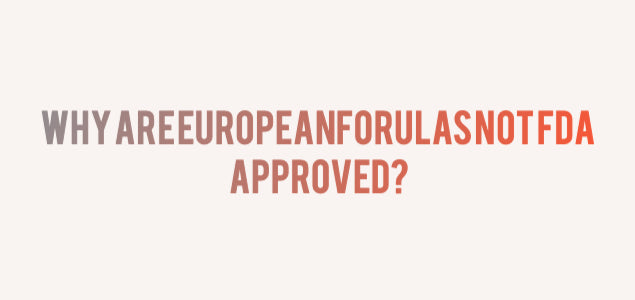Understanding FDA Approval Process
The Food and Drug Administration (FDA) is a federal agency responsible for protecting public health by ensuring the safety, efficacy, and security of human and veterinary drugs, biological products, medical devices, our nation's food supply, cosmetics, and products that emit radiation. When it comes to infant formulas, the FDA has set specific regulations that manufacturers must comply with to ensure their safety and nutritional content.However, it's essential to understand that the FDA does not "approve" infant formulas before they can be marketed. Instead, they establish regulations regarding the required nutrients in infant formulas and monitor manufacturers' compliance with these regulations.
Why Are European Formulas Not FDA Approved?
The primary reason why European infant formulas are not "FDA approved" is that they are manufactured and regulated under different standards set by the European Commission. These standards differ from those established by the FDA; hence these formulas do not undergo any approval process by the U.S regulatory body.European Commission's regulations are considered equally stringent if not more so than those of the FDA. They have strict guidelines regarding ingredients allowed in infant formula production – many of which are banned in Europe but still used in U.S formulas.
For instance, many U.S formulas contain corn syrup solids or other sweeteners as primary ingredients – substances that are prohibited in European formulas due to potential health risks. Furthermore, European standards mandate organic lactose as a carbohydrate source, while the FDA does not.
The Appeal of European Infant Formula
Despite not being FDA approved, European infant formulas have gained popularity among American parents. The appeal lies in the high-quality ingredients and rigorous manufacturing standards that these formulas adhere to.European formulas are known for their organic ingredients, absence of artificial sweeteners, GMOs, hormones, and synthetic nutrients. They also contain beneficial nutrients like prebiotics and probiotics that are often missing in U.S formulas.
Moreover, European infant formulas are manufactured under the "precautionary principle," which means if an ingredient is suspected of causing harm to humans or the environment but scientific consensus has not been reached, it is banned from use until proven safe.
Navigating the Gray Market
One significant concern with purchasing European infant formulas is that they often come through what's known as the "gray market." These products are imported by third-party sellers rather than directly from manufacturers. This can lead to potential issues with product handling, storage conditions, and even counterfeit products.To mitigate these risks, parents should purchase from reputable retailers who can provide transparency about their supply chain and guarantee product authenticity.
In conclusion, while European infant formula is not FDA approved due to differing regulatory standards, it doesn't necessarily mean they are inferior or unsafe. They adhere to equally strict regulations set by the European Commission and often contain higher quality ingredients than their U.S counterparts.
However, parents should always consult with a pediatrician before switching formulas or introducing a new one. This will ensure that your baby's nutritional needs are met appropriately. And remember, when purchasing European infant formula or any other product from overseas markets, always choose reputable retailers like Euromallusa to ensure product safety and authenticity.


























